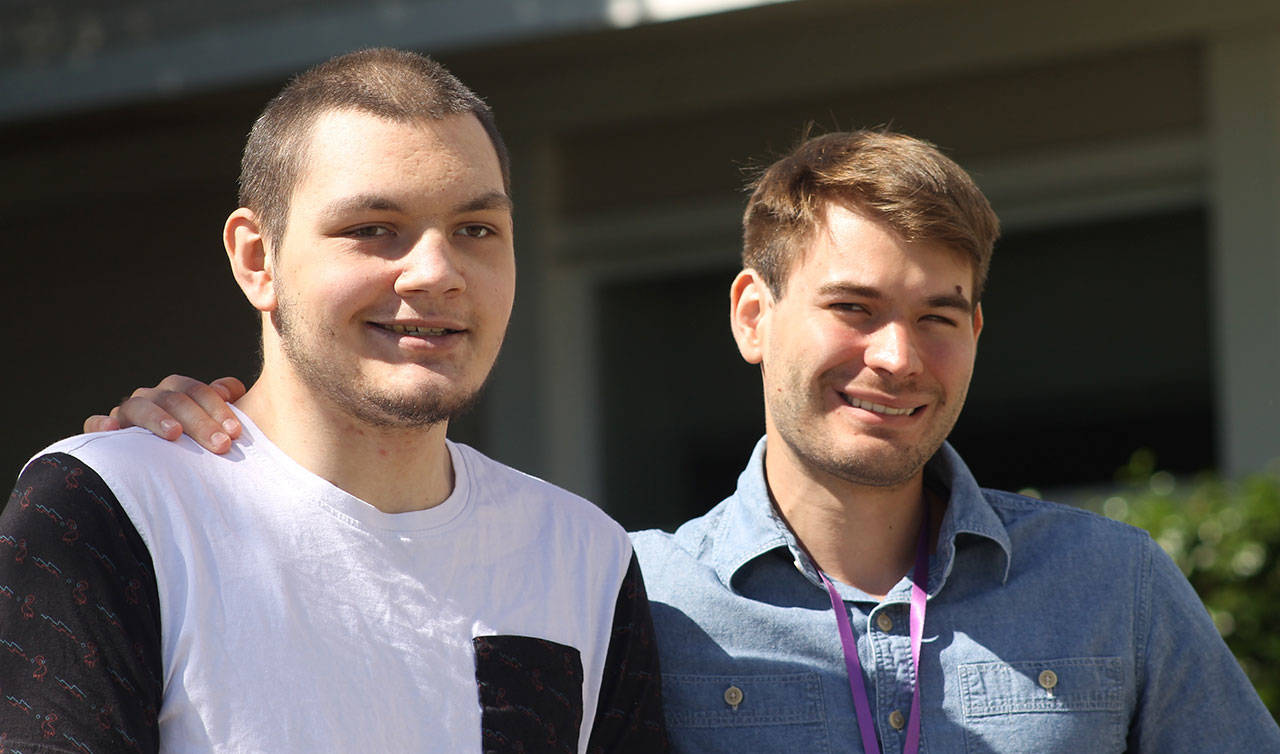About a year and a half ago, Friday Harbor High School senior Quincy Vague was a kicker and left tackle for the school’s football team. He played video games and threw shot put in track and field.
That was before doctors discovered his cancerous brain tumor in winter of 2017 that left him blind, as well as unable to stand or walk on his own. Today, the 17-year-old is adjusting to life with disabilities with the help of a local Stanford University professor, whose class on engineering for the differently abled has helped several district students discover the limitlessness of what can appear to be their disadvantages.
“We just assume, if we’re normally abled, that [differently abled people] want to be lifted up, but they don’t,” said Stanford professor John Moalli. “They just want to be included.”
A day before the last day of the 2017-18 school year ended, Vague sat in a special-needs classroom, listening to Moalli’s colleague Adrian Rodriguez, who, despite being legally blind at an early age, recently graduated from Stanford in computer science.
“Software development doesn’t require you to see anything,” said Rodriguez.
The contradiction was nothing new for the attending students, who use technology to compensate for their disabilities every day. Vague is blind but uses speech readers that translate websites into spoken language. Students Zach Crighton and Lili Light have limited speech due to cerebral palsy, but use iPads to vocalize text. Both have been guests in Moalli’s Stanford class where students design equipment to benefit the disabled.
Rodriguez is hoping technology cannot only augment their lives but allow them to take part in its creation. He is looking to patent a way for the blind to design software and websites with physical equipment as opposed to writing the language on screens. His goal is to create jobs in computer programing for the visually impaired, perhaps even for the tepid Vague, who agreed to a tutoring session from Rodriguez, but admitted coding “wasn’t his thing.”
With his lost vision, Vague is looking to find new career possibilities, as well as hobbies, to fit his altered world.
“Before I went blind, it’d be playing video games, running around, doing whatever,” he said about past summer breaks. “Now, it’s more just either sit around or actually do something and do braille.”
Vague, at 6 foot 4 inches, has a shy smile and commanding voice. He talked about the average interests of a teen — his love for Led Zeppelin, his plans to learn guitar — with the same ease as recounts of the cancer that stole his vision and his quick understanding of braille, a writing system the blind can use by touching raised dots on paper.
It was during mid-winter break in 2017 when Vague’s friend first noticed that his right eye looked lazy. A few days later, the then-sophomore woke in the hospital to learn he had grade three brain cancer. Doctors removed excess fluid in his brain, but Vague said pressure on his eyes from the procedure eventually prevented his eyesight.
Thanks to Rodriguez, Vague has learned of a possible profession in computer programing, as well as accessible sports, like goalball. Goalball, explained avid player Rodriguez, is a game solely for the visually impaired that allows athletes to catch a ball by listening for a bell inside.
Though Vague still needs to work on his mobility, he noted that Rodriguez’s words were needed motivation.
“I honestly didn’t know what I’d be doing in the future, but hearing him be able to do what he does sounds really inspirational,” said Vague.
The recent Stanford graduate conveyed to the teen that, while success as a blind person is not only possible but likely in the years to come, more importantly, so is enjoying life.
“I would argue that I had more fun than anybody,” said Rodriguez. “Definitely, know your future is as fun as you want it to be.”
To donate to Vague’s continued medical expenses, visit www.gofundme.com/quincys-medical-expenses or Islanders Bank in Friday Harbor and contribute to the “Quincy Vague Benefit Fund.” To donate to Rodriguez’s patent for a computer coding system for the blind, visit givebutter.com/KNmkkN.



